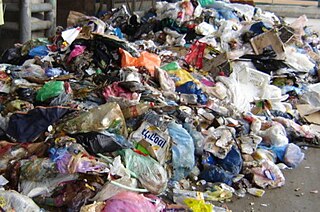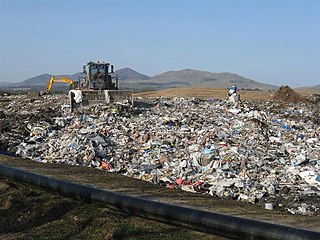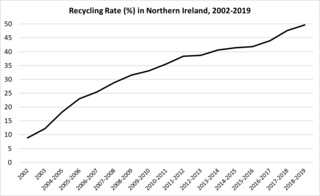Related Research Articles

Waste management or waste disposal includes the processes and actions required to manage waste from its inception to its final disposal. This includes the collection, transport, treatment, and disposal of waste, together with monitoring and regulation of the waste management process and waste-related laws, technologies, and economic mechanisms.

Zero waste is a set of principles focused on waste prevention that encourages redesigning resource life cycles so that all products are repurposed and/or reused. The goal of the movement is to avoid sending trash to landfills, incinerators, oceans, or any other part of the environment. Currently 9% of global plastic is recycled. In a zero waste system, all materials are reused until the optimum level of consumption is reached.

Waste hierarchy is a tool used in the evaluation of processes that protect the environment alongside resource and energy consumption from most favourable to least favourable actions. The hierarchy establishes preferred program priorities based on sustainability. To be sustainable, waste management cannot be solved only with technical end-of-pipe solutions and an integrated approach is necessary.
Articles related to waste management include:

Municipal solid waste (MSW), commonly known as trash or garbage in the United States and rubbish in Britain, is a waste type consisting of everyday items that are discarded by the public. "Garbage" can also refer specifically to food waste, as in a garbage disposal; the two are sometimes collected separately. In the European Union, the semantic definition is 'mixed municipal waste,' given waste code 20 03 01 in the European Waste Catalog. Although the waste may originate from a number of sources that has nothing to do with a municipality, the traditional role of municipalities in collecting and managing these kinds of waste have produced the particular etymology 'municipal.'

Landfills in the United Kingdom were historically the most commonly used option for waste disposal. Up until the 1980s, policies of successive governments had endorsed the "dilute and disperse" approach. Britain has since adopted the appropriate European legislation and landfill sites are generally operated as full containment facilities. However, many dilute and disperse sites remain throughout Britain.

Biodegradable waste includes any organic matter in waste which can be broken down into carbon dioxide, water, methane, compost, humus, and simple organic molecules by micro-organisms and other living things by composting, aerobic digestion, anaerobic digestion or similar processes. It mainly includes kitchen waste, ash, soil, dung and other plant matter. In waste management, it also includes some inorganic materials which can be decomposed by bacteria. Such materials include gypsum and its products such as plasterboard and other simple sulfates which can be decomposed by sulfate reducing bacteria to yield hydrogen sulfide in anaerobic land-fill conditions.
The Landfill Allowance Trading Scheme, LATS, is an initiative by the UK government, through DEFRA to help reduce the amount of biodegradable municipal waste (BMW) sent to landfill.

In 2015, 43.5% of the United Kingdom's municipal waste was recycled, composted or broken down by anaerobic digestion. The majority of recycling undertaken in the United Kingdom is done by statutory authorities, although commercial and industrial waste is chiefly processed by private companies. Local Authorities are responsible for the collection of municipal waste and operate contracts which are usually kerbside collection schemes. The Household Waste Recycling Act 2003 required local authorities in England to provide every household with a separate collection of at least two types of recyclable materials by 2010. Recycling policy is devolved to the administrations of Scotland, Northern Ireland and Wales who set their own targets, but all statistics are reported to Eurostat.
Waste management in Japan today emphasizes not just the efficient and sanitary collection of waste, but also reduction in waste produced and recycling of waste when possible. This has been influenced by its history, particularly periods of significant economic expansion, as well as its geography as a mountainous country with limited space for landfills. Important forms of waste disposal include incineration, recycling and, to a smaller extent, landfills and land reclamation. Although Japan has made progress since the 1990s in reducing waste produced and encouraging recycling, there is still further progress to be made in reducing reliance on incinerators and the garbage sent to landfills. Challenges also exist in the processing of electronic waste and debris left after natural disasters.

Food waste in the United Kingdom is a subject of environmental, and socioeconomic concern that has received widespread media coverage and been met with varying responses from government. Since 1915, food waste has been identified as a considerable problem and has been the subject of ongoing media attention, intensifying with the launch of the "Love Food, Hate Waste" campaign in 2007. Food waste has been discussed in newspaper articles, news reports and television programmes, which have increased awareness of it as a public issue. To tackle waste issues, encompassing food waste, the government-funded "Waste & Resources Action Programme" (WRAP) was created in 2000.

Waste management laws govern the transport, treatment, storage, and disposal of all manner of waste, including municipal solid waste, hazardous waste, and nuclear waste, among many other types. Waste laws are generally designed to minimize or eliminate the uncontrolled dispersal of waste materials into the environment in a manner that may cause ecological or biological harm, and include laws designed to reduce the generation of waste and promote or mandate waste recycling. Regulatory efforts include identifying and categorizing waste types and mandating transport, treatment, storage, and disposal practices.
SUEZ Recycling and Recovery UK Ltd, formerly SITA UK Limited, is a British waste management company, established in 1988. It was previously called Sitaclean Technology. It began as a provider of local authority services, with its first municipal services contract in Erewash, Derbyshire in 1989. Suez has expanded its business through a combination of new contracts, joint venture partnerships and acquisitions.
The City of Oakland, California, adopted a Zero Waste Strategic Plan in 2006, detailing a road map for the City to follow toward the implementation of a Zero Waste System by 2020. As stated in a City Resolution, introduced by then Mayor Jerry Brown, Zero Waste principles:

Recycling in Northern Ireland
Resource recovery is using wastes as an input material to create valuable products as new outputs. The aim is to reduce the amount of waste generated, thereby reducing the need for landfill space, and optimising the values created from waste. Resource recovery delays the need to use raw materials in the manufacturing process. Materials found in municipal solid waste, construction and demolition waste, commercial waste and industrial wastes can be used to recover resources for the manufacturing of new materials and products. Plastic, paper, aluminium, glass and metal are examples of where value can be found in waste.

It is estimated that 290 million tonnes of waste was produced in the United Kingdom in 2008 but volumes are declining. In 2012 municipal solid waste generation was almost 30 million tonnes, according to Waste Atlas Platform.

Waste management in Australia started to be implemented as a modern system by the second half of the 19th century, with its progresses driven by technological and sanitary advances. It is currently regulated at both federal and state level. The Commonwealth's Department of the Environment and Energy is responsible for the national legislative framework.
In the United Kingdom, a Responsibility Deal is a voluntary agreement between the government and businesses to work together to secure improvements in a key area of public policy.
References
- ↑ Ss.44A-44B
- ↑ Environmental Protection Act 1990, s.44A(4)/ 44B(5)
- ↑ Environmental Protection Act 1990, Sch.2A
- ↑ "HC Deb 24 May 2000 vol 350 cc542-4W". Parliamentary Debates (Hansard) . 2000. Retrieved 2008-07-24.
- ↑ Defra (2007). "Waste Strategy for England 2007" (PDF) (Cm 7086 ed.). Archived from the original (PDF) on 2007-06-26. Retrieved 2008-07-24.
- ↑ "Waste Strategy for England 2007" (PDF). Defra. 2007. Retrieved 2014-07-22.
- ↑ "Waste Management Plan for England" (PDF). Defra. 2013. Retrieved 2014-07-22.
- ↑ "Wise About Waste: The National Waste Strategy for Wales" (PDF). Welsh Assembly Government. 2002. Retrieved 2014-07-22.
- ↑ "Towards Zero Waste: One Wales. One Planet" (PDF). Welsh Assembly Government. 2010. Retrieved 2014-07-22.
- ↑ "National Waste Plan" (PDF). Waste Action Scotland. 2003. Retrieved 2014-07-22.
- ↑ "Scotland's Zero Waste Plan" (PDF). The Scottish Government. 2010. Retrieved 2014-07-22.
- ↑ "Waste Management Strategy 2000 - 2006". Department of the Environment. Retrieved 2014-07-22.
- ↑ "Towards Resource Management: The Northern Ireland Waste Management Strategy 2006 - 2020" (PDF). Department of the Environment. 2006. Retrieved 2014-07-22.
- ↑ "Delivering Resource Efficiency" (PDF). Department of the Environment. 2013. Retrieved 2014-07-22.